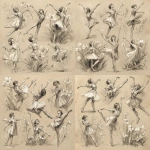Explore the Best AI Image Gallery

Quantum Leaps: How Quantum Computing Will Rewrite the Creative Industry
The world of creativity is on the cusp of a paradigm shift, driven by the unprecedented power of quantum computing. This revolutionary technology, with its ability to process information at an unimaginable scale, promises to reshape the creative landscape in ways we are only beginning to imagine.
Beyond Classical Limits: The Quantum Advantage
Classical computers, while powerful, operate on bits—binary units representing 0 or 1. Quantum computers, however, leverage the principles of quantum mechanics, utilizing qubits that can exist in a superposition of both states simultaneously. This allows them to perform calculations exponentially faster than their classical counterparts.
This quantum advantage has profound implications for creative fields. Imagine:
- Drug Discovery and Design: Quantum simulations could accelerate the development of new pharmaceuticals, enabling personalized medicine and targeted therapies.
- Materials Science: Researchers could design novel materials with unique properties, revolutionizing industries from aerospace to electronics.
- Artistic Expression: Quantum algorithms could generate intricate patterns, compose symphonies, or even create entirely new forms of art, blurring the lines between human and machine creativity.
Quantum Creativity: New Tools for Artistic Innovation
The impact of quantum computing on the creative industry extends beyond raw processing power. It presents a suite of novel tools that can empower artists and designers:
- Generative Design: Quantum algorithms can generate countless variations of a design, allowing for exploration of innovative concepts and pushing the boundaries of aesthetic expression.
- Interactive Art Experiences: Quantum-powered installations could create immersive and responsive artworks that adapt to audience interactions, blurring the line between viewer and participant.
- Personalized Storytelling: Imagine narratives that dynamically evolve based on user choices, creating truly unique and personalized experiences.
Navigating the Ethical Landscape
As with any powerful technology, quantum computing raises ethical considerations that must be carefully addressed. Some key concerns include:
- Bias and Fairness: Quantum algorithms can inherit biases present in the data they are trained on, potentially perpetuating existing inequalities.
- Intellectual Property: The ability to generate creative content using quantum algorithms raises questions about ownership and copyright.
- Transparency and Explainability: The complex nature of quantum computations can make it difficult to understand how outputs are generated, raising concerns about accountability and trust.
Future Trends: A Quantum Leap Forward
The field of quantum computing is rapidly evolving. Future trends that will shape the creative industry include:
- Increased Accessibility: Cloud-based quantum computing platforms will make this powerful technology more accessible to individuals and organizations.
- Hybrid Approaches: Combining classical and quantum computing will unlock new possibilities, leveraging the strengths of both paradigms.
- Quantum Education and Research: Investments in education and research will foster a new generation of quantum-literate creators and innovators.
The convergence of quantum computing and creativity holds immense promise. As we navigate this uncharted territory, it is crucial to foster responsible development and ensure that these transformative technologies benefit all of humanity.






](https://images.ai-img.art/thumbnails/150/915b5e50ce61f6219cb8f764d89e2efcb8ad3a9ebd09e0670ae7dc0e2c99a8bd.webp)









](https://images.ai-img.art/thumbnails/150/78b567a3483191dd52f3d16038b5a926e03e4066d5b301cfff023fb91a962e67.webp)
](https://images.ai-img.art/thumbnails/150/cf8299cc184c859eff89d17514689e19c7994ad29256a58ad77fa0f7218e2cff.webp)
](https://images.ai-img.art/thumbnails/150/aed4d771a0a5b63bed28f6e7183dd4614c5e3e3586d300c8d879ccbb37dbfb4e.webp)



















](https://images.ai-img.art/thumbnails/150/da89993919887fcf2c84af5ec12f2ac997ad0f67c8bf00fecd67ba06a1b3dc49.webp)





](https://images.ai-img.art/thumbnails/150/476665d1452e44d38d5b4fbf5fab4389a6131d55b7bfe8a41d7f65f66b5a9310.webp)




